White Product Orders Processing
1.0 Purpose
The main purpose of this process is to deliver the white/liquid products to the dealers.
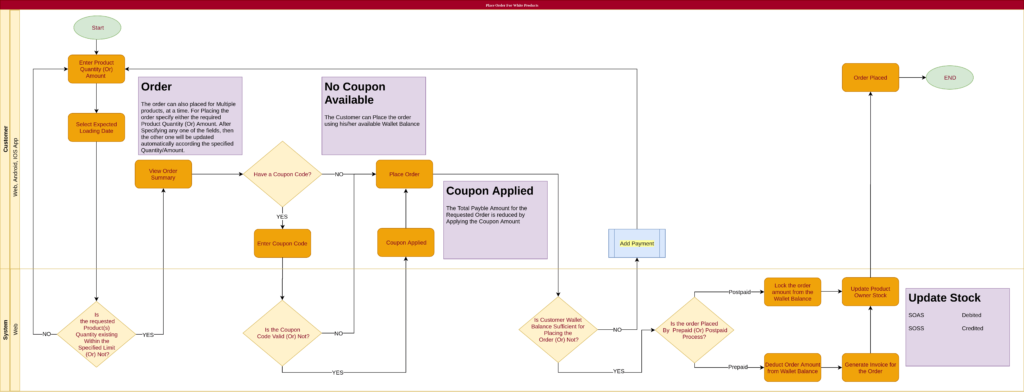
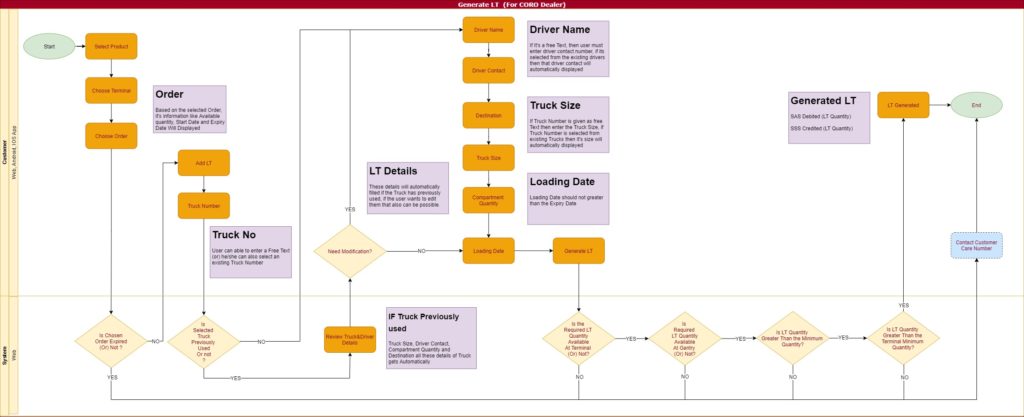
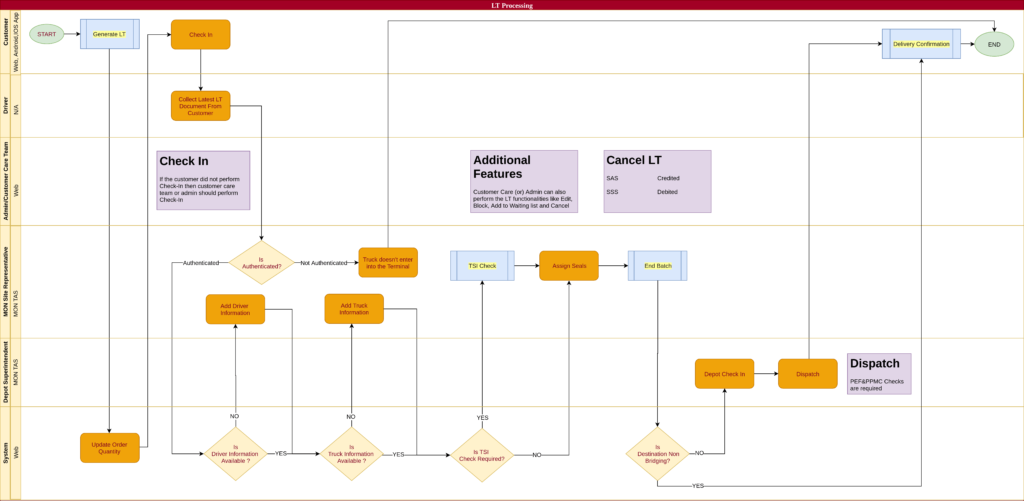
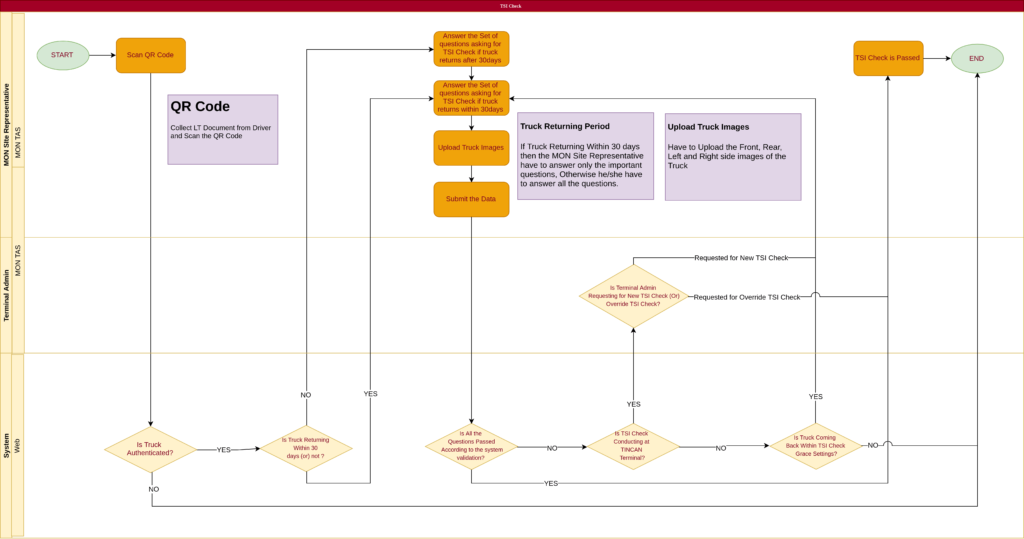
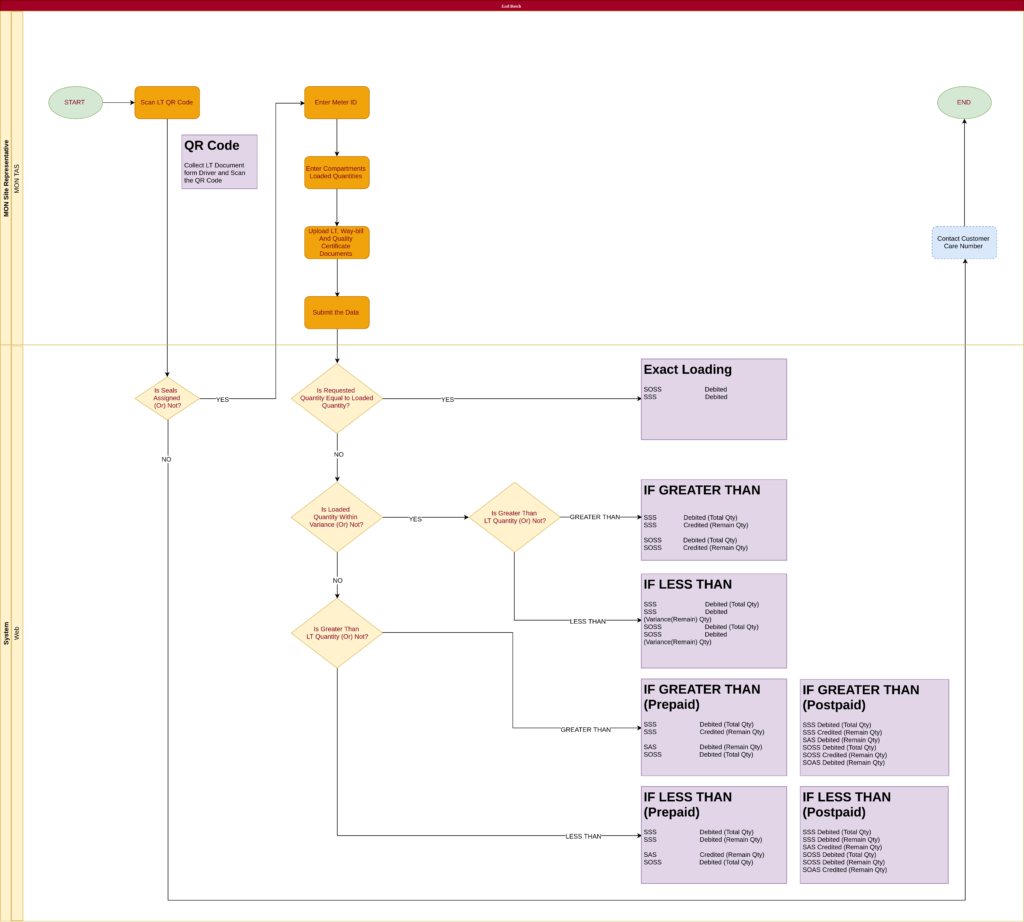
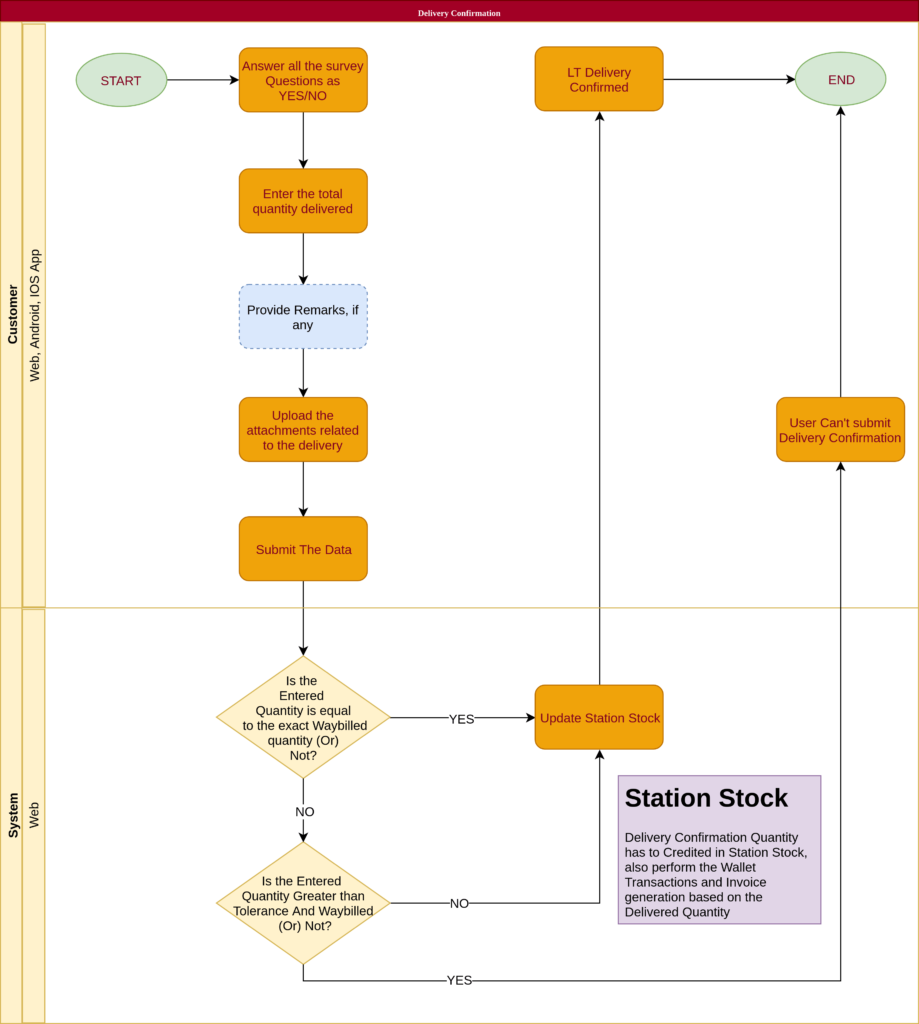
PPMC Process
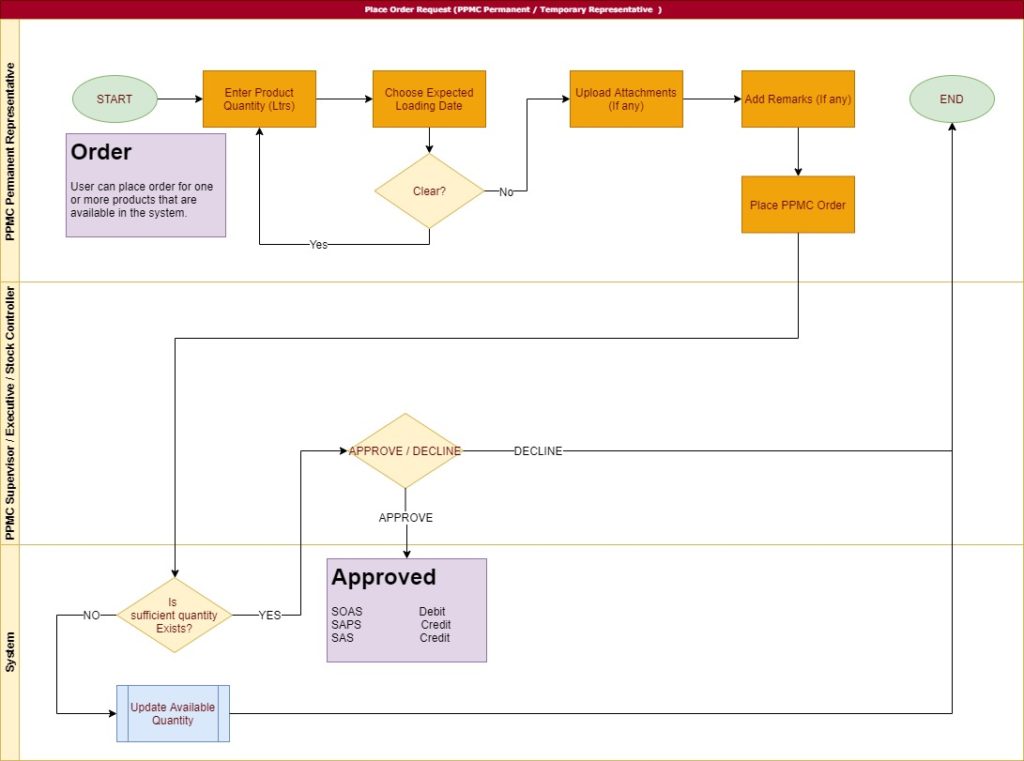
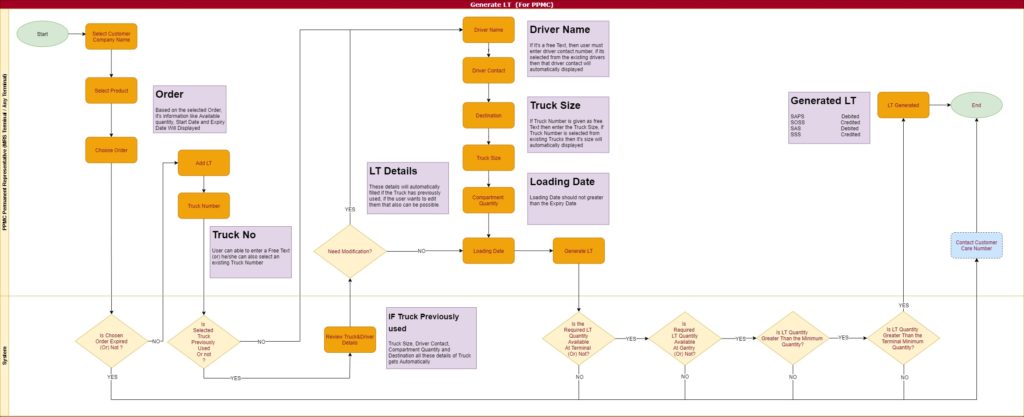
1.1 Who can place the white/liquid product orders?
- Dealers [ Bulk Buyers ]
- RORO Dealers
- CORO Dealers
- COCO Dealers
- Independent Dealers
- Customer Care Team on behalf of dealers
- MRS Admin
1.2 Navigation Path
- Transactions > Place Order
- Place Order button in header menu
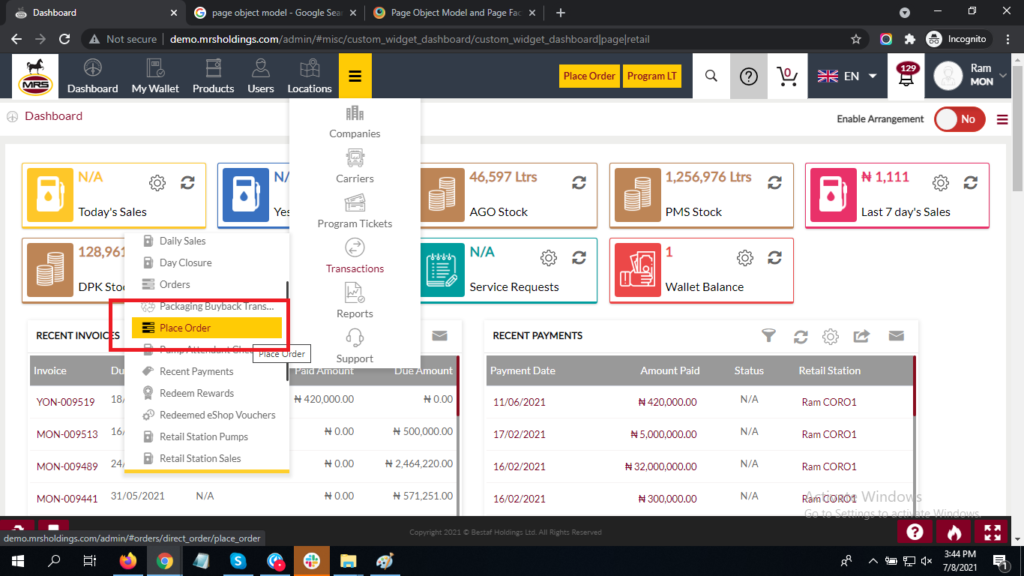
| Page/Screen | Menu / Dashboard |
| Application | Portal Web |
| Role | Dealer, RORO Dealer, CORO Dealer, COCO Dealer, ID |
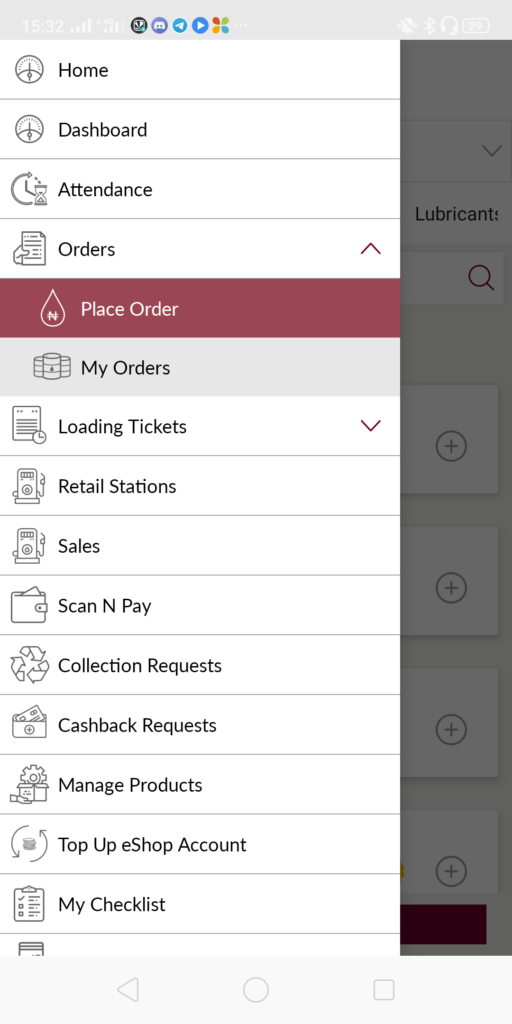
| Page/Screen | Menu |
| Application | Portal Customer App |
| Role | Dealer, RORO Dealer, CORO Dealer, COCO Dealer, ID |
1.3 Different Applications Involved in Process
- Portal Web
- Portal Customer App
- TAS / MON TAS
1.4 Filtering White/Liquid Products in Place Order
In place order page it shows all the products which are applicable to the logged in user or selected customer by CC team or MRS Admin. In place order page user can filter the white/liquid products using the product type filer.

| Page/Screen | Place Order |
| Application | Portal Web |
| Role | Dealer, RORO Dealer, CORO Dealer, COCO Dealer, ID |
1.5 Adding Products to the Cart
From place order page users can add the required products into the cart by entering the quantity or amount in the respective fields. After adding the products into the cart by clicking on the next button user moves to the order summary page to display all the product details with the product prices details.
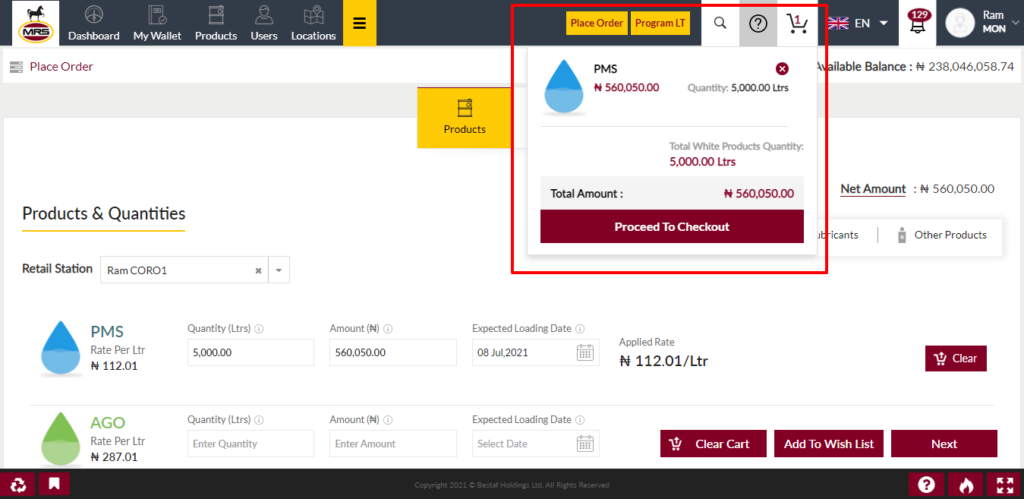
| Page/Screen | Place Order |
| Application | Portal Web |
| Role | Dealer, RORO Dealer, CORO Dealer, COCO Dealer, ID |
1.6 Placing White/Liquid Product Order
In order summary page user will review all the products which are added into the cart and by clicking on the place order button system places an order with the added products. Before placing the order system will check whether the customer’s/dealer’s wallet is having sufficient amount or not. If the wallet is not having sufficient funds then system will not allow user to place the order. If the amount is available then system places an order and the order amount will be locked by displaying under pending orders amount.
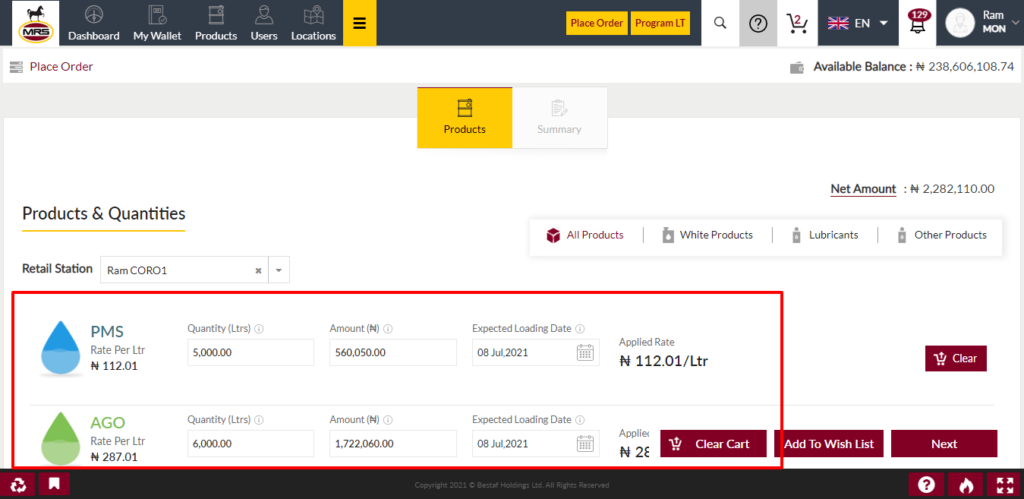
| Page/Screen | Place Order |
| Application | Portal Web |
| Role | Dealer, RORO Dealer, CORO Dealer, COCO Dealer, ID |
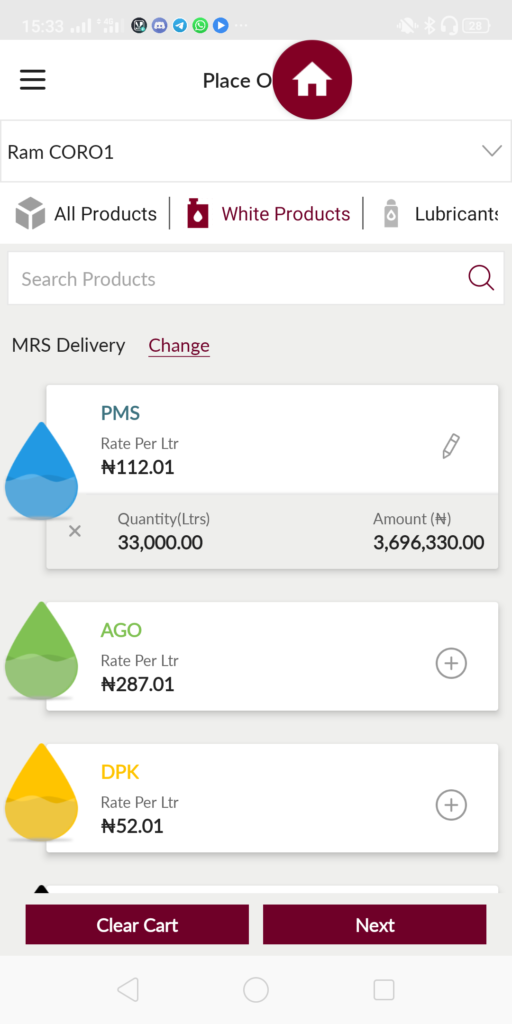
| Page/Screen | Place Order |
| Application | Portal Customer App |
| Role | Dealer, RORO Dealer, CORO Dealer, COCO Dealer, ID |
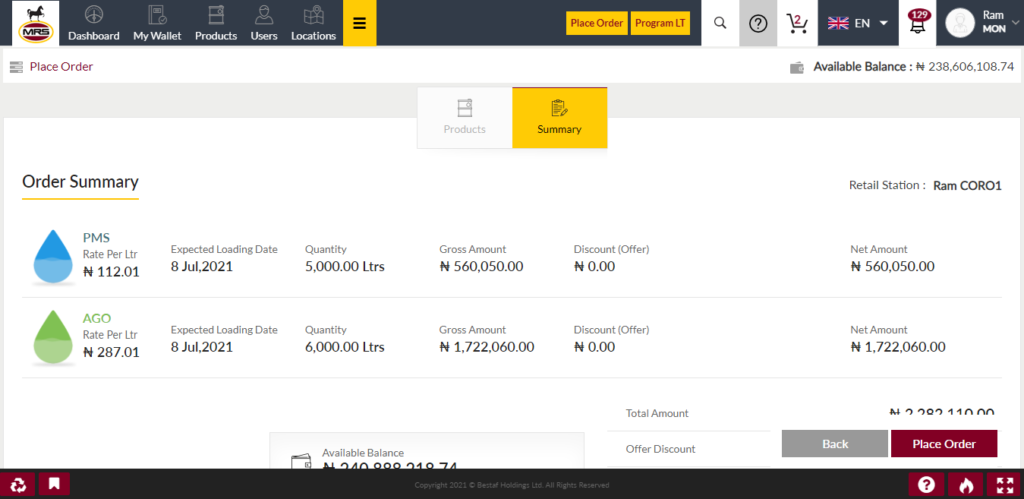
| Page/Screen | Order Summary |
| Application | Portal Web |
| Role | Dealer, RORO Dealer, CORO Dealer, COCO Dealer, ID |
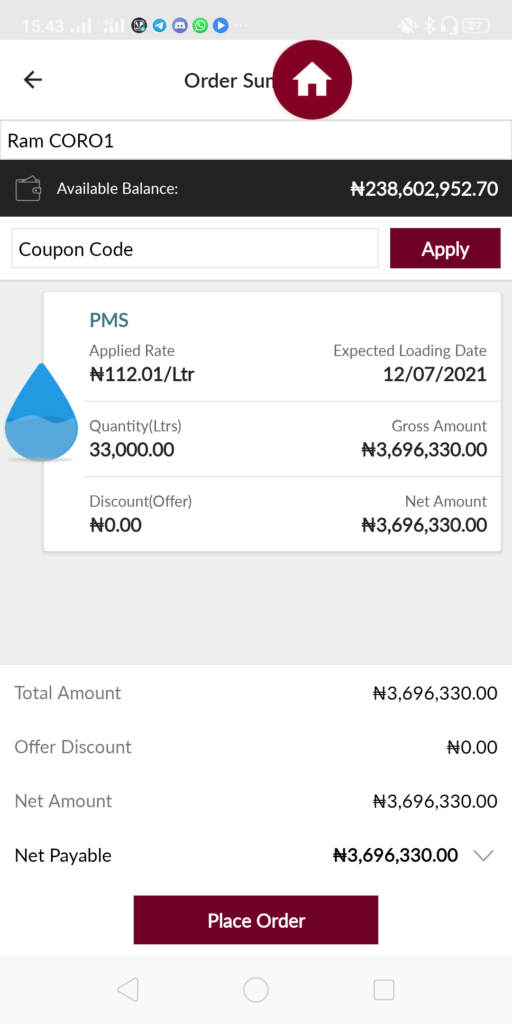
| Page/Screen | Order Summary |
| Application | Portal Customer App |
| Role | Dealer, RORO Dealer, CORO Dealer, COCO Dealer, ID |
Once the order is placed then the following stock transactions will be performed.
1. Order quantity will be debited from the SOAS[Supplier/Company Overall Available Stock] account.
2. Order quantity will be credited into the SOSS[ Supplier/Company Overall Sold Stock ] account.
Example:
Order Qty – 33,000 Ltrs
| Account Type | Transaction Type | Quantity |
| SOAS | Debit | 33,000 |
| SOSS | Credit | 33,000 |
1.7 Billing Mode for the Orders and Invoice Generation
Here for the dealers there is a billing mode for their company classifications. Following are the different billing modes.
1. Pre-Paid
2. Charge On Waybill
3. Charge On Delivery
If the billing mode is pre-paid then dealers must complete their payment before lifting the product. After completion of the payment only users can program the loading tickets. For pre-paid dealers, MRS Admin can place orders by allowing users to lift the product by giving some due date. If the due date is crossed but the payment is not submitted then those orders will not allow to program.
If the billing mode is charge on waybill then the invoice will be generated for the customer after completion of end batch. Based on the loaded quantity the invoice will be generated. If the loaded quantity is less than or greater than the configured company/terminal tolerance value then system will charge only for the programmed quantity. If the loaded quantity is out of the tolerance level then the system generates the invoice for the loaded quantity
If the billing mode is charge on delivery then the invoice will be generated for the customer after completion of the delivery confirmation. Based on the delivered quantity the invoice will be generated. If the delivery confirmation is given more than the loaded quantity then system will generate the invoice for confirmed delivered quantity. If the delivery confirmation is given less than the loaded and quantity and out of the tolerance level then system generates a dispute request against the loading ticket. MRS Admin will check the dispute and update the original quantity and decides the payable entity for missing quantity. While closing the dispute the quantity which is decided for that quantity invoice will be generated.
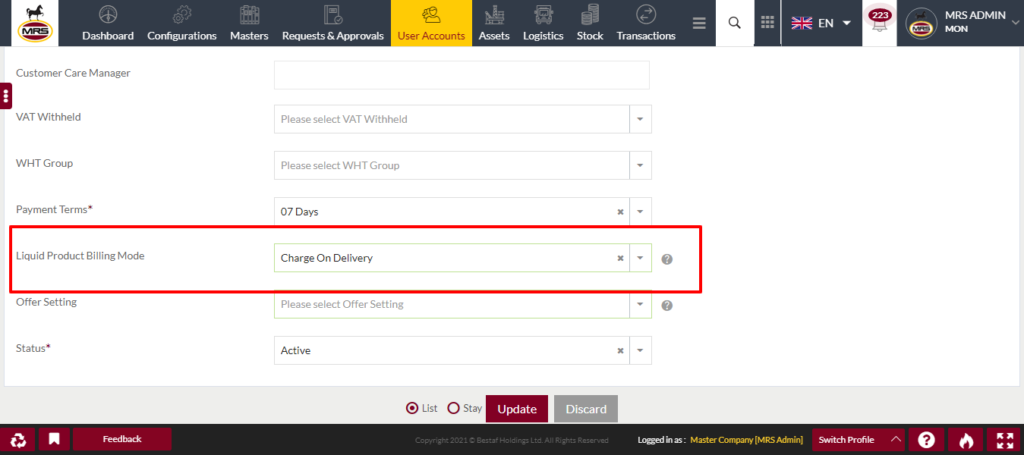
| Page/Screen | Edit Company Classification |
| Application | Portal Web |
| Role | MRS Admin |
| Navigation Path | Company Details > Edit Company > Company Classifications > Company Classification Details |
1.8 Program Loading Tickets for the Orders
Dealers can program the loading tickets if orders are available for loading. Users can navigate to the program loading ticket page in 2 ways. They are as follows:
1. Loading Tickets > Program LT
2. Program LT button in header menu
Under program loading ticket page, user need to provide the Terminal, truck reg. no., driver, loading date, truck compartment bifurcation, destination and final destination. To generate a loading ticket Terminal, Loading Date, LT quantity, Destination and Final Destination fields are mandatory.
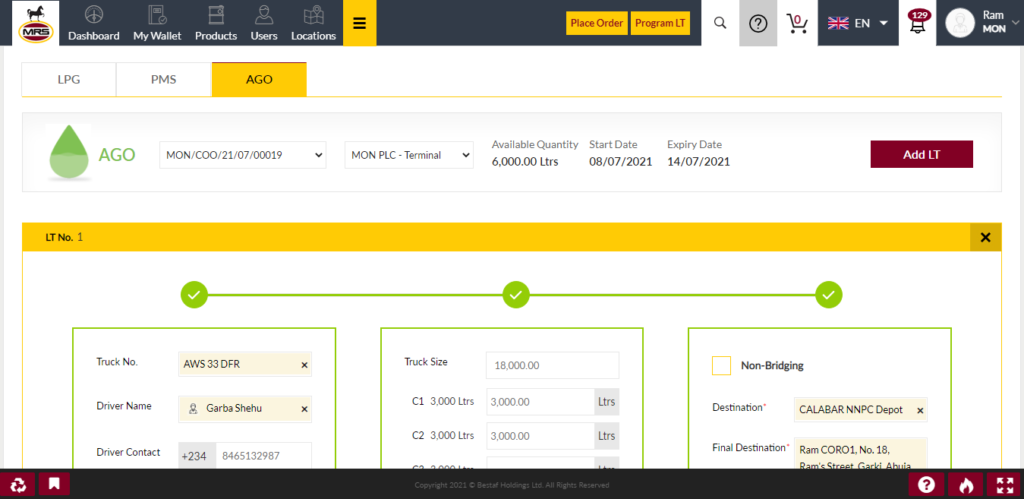
| Page/Screen | Program LT |
| Application | Portal Web |
| Role | Dealer, RORO Dealer, CORO Dealer, COCO Dealer, ID |
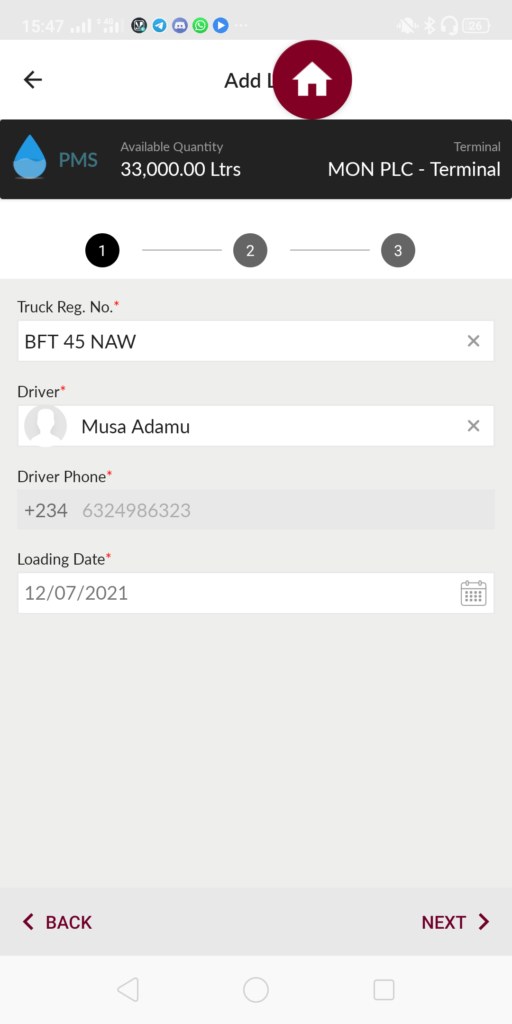
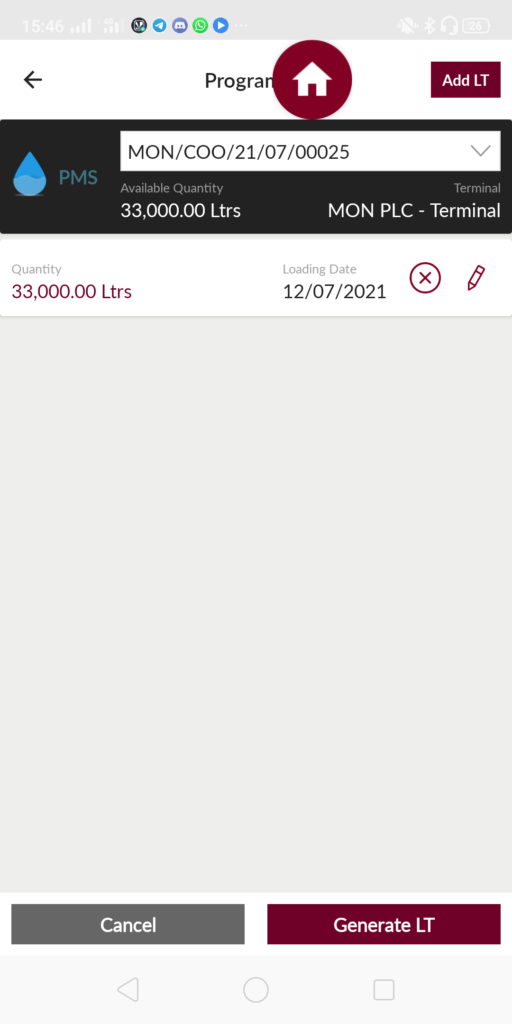
| Page/Screen | Order Summary |
| Application | Portal Customer App |
| Role | Dealer, RORO Dealer, CORO Dealer, COCO Dealer, ID |
| Navigation Path | Program Tickets > Add LT > Program LT |
If user did not provide the truck, driver details then the loading ticket will be generated with awaiting programming status.
Before generating the loading ticket system will check the available quantity at the selected terminal. If sufficient stock is not available then system will not allow to program loading ticket.
Before generating the loading ticket system will check the gantry availability at the selected terminal. If sufficient availability is not there then system will not allow to program loading ticket.
Once the loading ticket is generated then the following stock transactions will be performed.
1. LT quantity will be debited from the SAS[Supplier/Company Available Stock] account.
2. LT quantity will be credited into the SSS[Supplier/Company Sold Stock] account.
Example:
Order Qty – 33,000 Ltrs
LT Programmed – 33,000 Ltrs
| Account Type | Transaction Type | Quantity |
| SAS | Debit | 33,000 |
| SSS | Credit | 33,000 |
From the generated loading ticket user can edit the loading ticket by providing the truck and driver details. Then the loading ticket status will update to the programmed status if the LT is having truck, driver, destination, final destination and loading date.
If the generated loading is for the MRS Tincan Terminal then the loading ticket will sync to the TAS system otherwise LT can be processed from the Portal only.
1.9 Check In for Loading Ticket
Once the loading ticket is programmed then user need to perform the check-in to the loading ticket when user is ready to travel to terminal to load the truck. When user perform the Check In then the status of the LT becomes Checked In
Users can perform the cancel check-in if user want to do. Then the status of the LT becomes programmed again.

| Page/Screen | Loading Tickets |
| Application | Portal Web |
| Role | Dealer, RORO Dealer, CORO Dealer, COCO Dealer, ID |
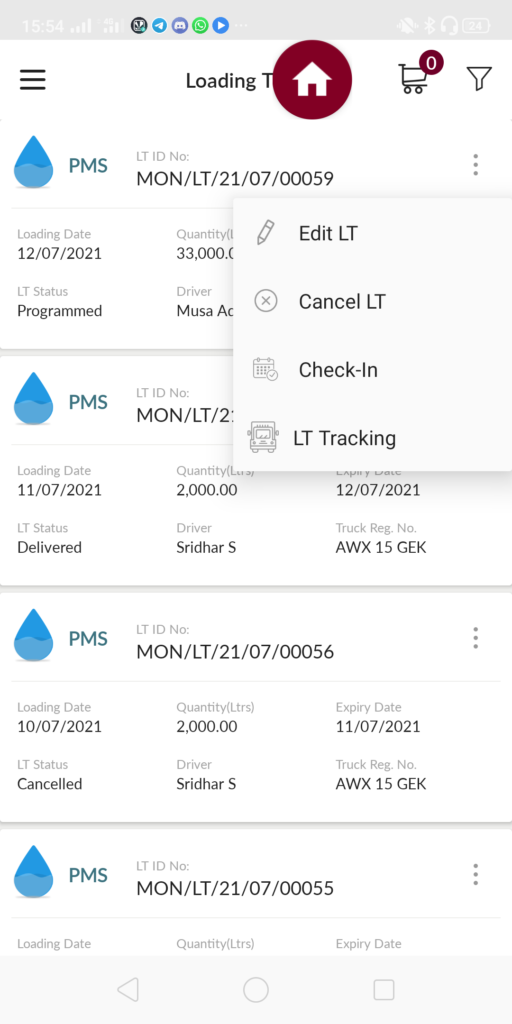
| Page/Screen | Loading Tickets |
| Application | Portal Customer App |
| Role | Dealer, RORO Dealer, CORO Dealer, COCO Dealer, ID |
2.0 LT Authentication at Terminal
Once the truck reaches the terminal then the security person will verify the truck details with the loading ticket PDF. If the loading ticket is programmed for MRS Tincan Terminal then TSI Supervisor will scan the loading ticket QR code from TAS application to authenticate the loading ticket. If the loading ticket is programmed for other terminals then terminal site representative will authenticate the loading ticket by scanning the loading ticket QR code from MON TAS application.
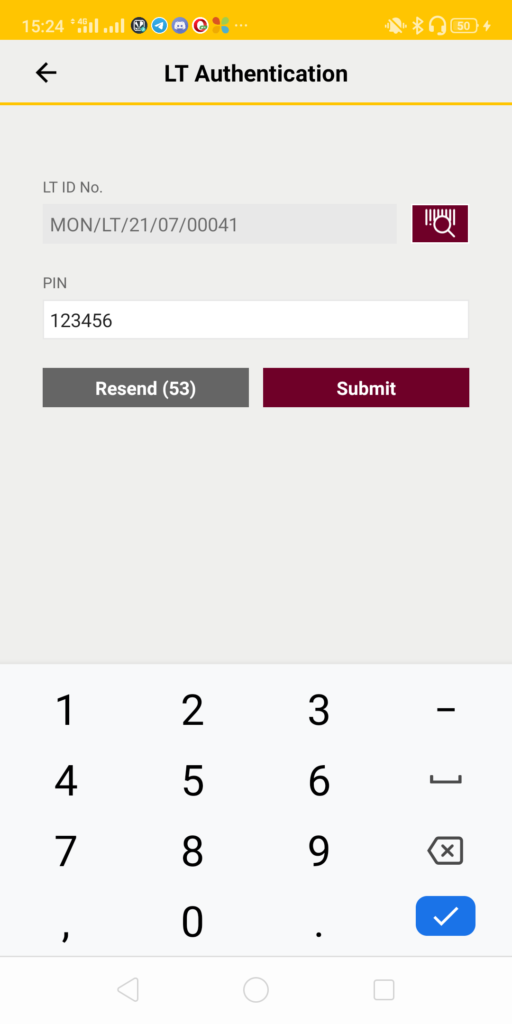
| Page/Screen | LT Authentication Screen |
| Application | TAS / MON TAS |
| Role | TSI Supervisor / Terminal Site Representative |
Once the truck is authenticated then the truck goes for the TSI [Truck Safety Inspection] check if the terminal is opted for TSI check.
If the LT authentication is completed and the selected terminal is not having the TSI check then the status of the LT becomes Security Pin Verified. If the LT authentication is completed and the selected terminal is having the TSI check then the status of the LT becomes Waiting for TSI check status.
2.1 TSI Check for Loading Ticket
The loading ticket terminal will have the configuration whether the TSI check is required or not at the selected terminal. If the TSI check is not required for the selected terminal then those loading tickets will not come for this step.
If TSI check is required for the truck then system will check whether this truck came earlier or not for the same terminal. If the truck came to the terminal within the configured time period then the set of TSI questions will be different from actual TSI check questions. Some questions/inspection criteria will be compromised if the truck comes again to the terminal with in the configured days i.e. 30 days.
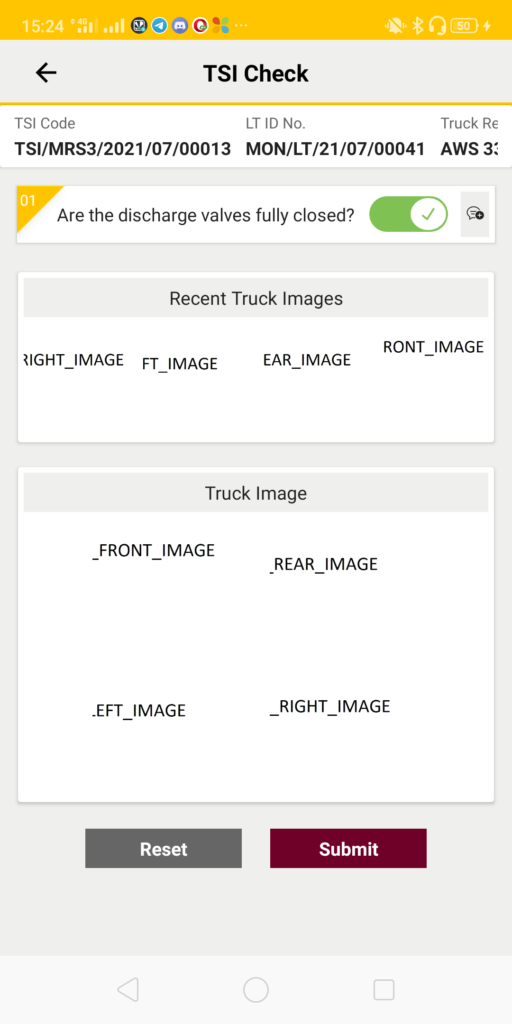
| Page/Screen | TSI Check Screen |
| Application | TAS / MON TAS |
| Role | TSI Supervisor / Terminal Site Representative |
If the TSI check is failed due to any reason then the truck will not go further to proceed with the loading. First user need to fix the failed criteria and then need to take the re-inspection before the TSI check grace period completion. For every terminal will have the TSI check grace period as a terminal setting.
If TSI check is passed then the status updates to the TSI Check Completed. If TSI check is failed then the status of the LT updates to the TSI Check Failed.
2.2 Seals Assignment for Loading Ticket
After completion of the LT authentication if the terminal is not having the TSI check then the loading ticket/truck will move to the seals assignment. If TSI check is available then after TSI check pass only the truck will come for the seals assignment. Terminal site representative will provide the seals to the driver.
If the selected terminal is MRS Tincan Terminal then the given seals must be unique. User can not give the already used seal to another loading ticket/truck. If the selected terminal is other than the MRS Tincan Terminal then the discharge seal box number must be unique.
Once seals have been provided then the loading ticket status updates to the Seals Assigned status.
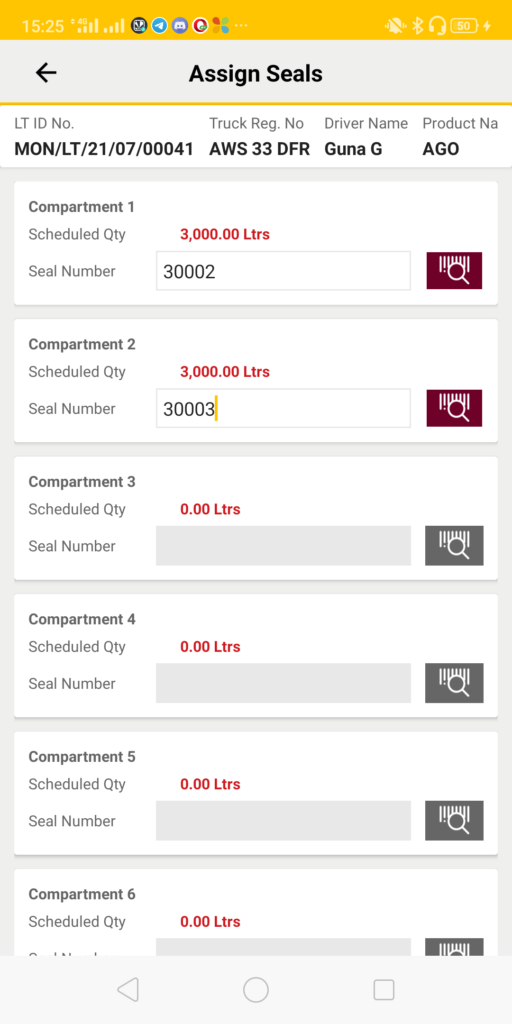
| Page/Screen | Assign Seals Screen |
| Application | TAS / MON TAS |
| Role | TSI Supervisor / Terminal Site Representative |
2.3 End Batch for Loading Ticket
Once the loading ticket is having the seals then the LT/truck will move to the gantry to load the truck. If the loading ticket is programmed for MRS Tincan Terminal then the end batch will be completed via PLC. If the loading ticket is programmed for other than MRS Tincan Terminal then the LT need to be waybilled manually by the terminal site representative. In end batch screen user need to provide the PPMC Ticket Number, Invoice Number if applicable otherwise it is required to provide only the loaded compartment bifurcation with quantity.
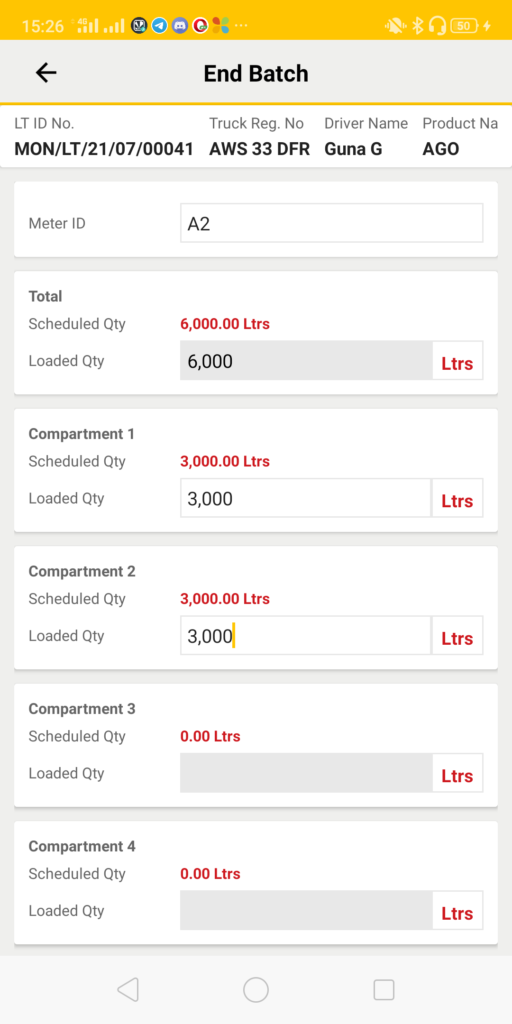
| Page/Screen | End Batch Screen |
| Application | TAS / MON TAS |
| Role | Terminal Operator / Terminal Site Representative |
Once the loading ticket is waybilled then the following stock transactions will be performed
1. LT loaded quantity will be debited from the SSS[Supplier/Company Sold Stock] account.
2. LT loaded quantity will be debited from the SOSS[Supplier/Company Overall Sold Stock] account.
Example:
Order Qty – 33,000 Ltrs
LT Programmed Qty – 33,000 Ltrs
LT Waybilled Qty – 33,000 Ltrs
| Account Type | Transaction Type | Quantity |
| SSS | Debit | 33,000 |
| SOSS | Debit | 33,000 |
If the loaded quantity is greater than or the less than the programmed quantity and within the variance then the following transactions will be performed.
If the loaded quantity is greater than the programmed quantity and with in the variance then the transactions will be as follows
1. LT loaded quantity will be debited from the SSS[Supplier/Company Sold Stock] account.
2. The tolerance quantity or the extra loaded quantity will be credited into the SSS account as a tolerance loss
3. LT loaded quantity will be debited from the SOSS[Supplier/Company Overall Sold Stock] account.
4. The tolerance quantity or the extra loaded quantity will be credited into the SOSS account as a tolerance loss
Example:
Order Qty – 33,000 Ltrs
LT Programmed Qty – 33,000 Ltrs
LT Waybilled Qty – 33,001 Ltrs
| Account Type | Transaction Type | Quantity |
| SSS | Debit | 33,001 |
| SSS | Credit | 1 |
| SOSS | Debit | 33,001 |
| SOSS | Credit | 1 |
If the loaded quantity is less than the programmed quantity and with in the variance then the transactions will be as follows
1. LT loaded quantity will be debited from the SSS[Supplier/Company Sold Stock] account.
2. The tolerance quantity or the under loaded quantity will be debited from the SSS account as a tolerance gain
3. LT loaded quantity will be debited from the SOSS[Supplier/Company Overall Sold Stock] account.
4. The tolerance quantity or the under loaded quantity will be debited from the SOSS account as a tolerance gain
Example:
Order Qty – 33,000 Ltrs
LT Programmed Qty – 33,000 Ltrs
LT Waybilled Qty – 22,999 Ltrs
| Account Type | Transaction Type | Quantity |
| SSS | Debit | 22,999 |
| SSS | Debit | 1 |
| SOSS | Debit | 22,999 |
| SOSS | Debit | 1 |
If the loaded quantity is greater than or the less than the programmed quantity and Out of the variance then the following transactions will be performed.
If the loaded quantity is greater than the programmed quantity and out of the variance then the transactions will be as follows
1. LT loaded quantity will be debited from the SSS[Supplier/Company Sold Stock] account.
2. The tolerance quantity or the extra loaded quantity will be credited into the SSS account as a overloaded quantity
3. The tolerance quantity or the extra loaded quantity will be debited from the SAS account as overloaded quantity
4. LT loaded quantity will be debited from the SOSS[Supplier/Company Overall Sold Stock] account.
5. The tolerance quantity or the extra loaded quantity will be credited into the SOSS account as a overloaded quantity
6. The tolerance quantity or the extra loaded quantity will be debited from the SOAS account as overloaded quantity
Example:
Order Qty – 33,000 Ltrs
LT Programmed Qty – 33,000 Ltrs
LT Waybilled Qty – 33,200 Ltrs
| Account Type | Transaction Type | Quantity |
| SSS | Debit | 33,200 |
| SSS | Credit | 200 |
| SAS | Debit | 200 |
| SOSS | Debit | 33,200 |
| SOSS | Credit | 200 |
| SOAS | Debit | 200 |
If the loaded quantity is less than the programmed quantity and out of the variance then the transactions will be as follows
1. LT loaded quantity will be debited from the SSS[Supplier/Company Sold Stock] account.
2. The tolerance quantity or the under loaded quantity will be debited from the SSS account as a underloaded quantity
3. The tolerance quantity or the under loaded quantity will be credited into the SAS account as underloaded quantity
4. LT loaded quantity will be debited from the SOSS[Supplier/Company Overall Sold Stock] account.
5. The tolerance quantity or the under loaded quantity will be debited from the SOSS account as a underloaded quantity
6. The tolerance quantity or the under loaded quantity will be credited into the SOAS account as underloaded quantity
Example:
Order Qty – 33,000 Ltrs
LT Programmed Qty – 33,000 Ltrs
LT Waybilled Qty – 32,800 Ltrs
| Account Type | Transaction Type | Quantity |
| SSS | Debit | 32,800 |
| SSS | Debit | 200 |
| SAS | Credit | 200 |
| SOSS | Debit | 32,800 |
| SOSS | Debit | 200 |
| SOAS | Credit | 200 |
2.4 Cancel Loading Ticket
Loading ticket can be cancelled at any time before completing the end batch or waybill. Once the loading ticket is cancelled then the status of the LT becomes as Cancelled.
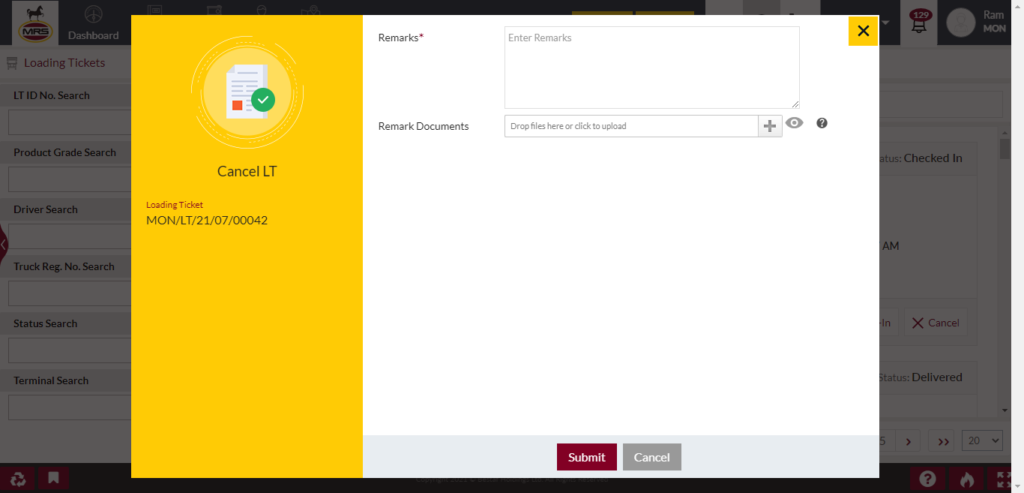
| Page/Screen | Loading Tickets |
| Application | Portal Web |
| Role | Dealer, RORO Dealer, CORO Dealer, COCO Dealer, ID |
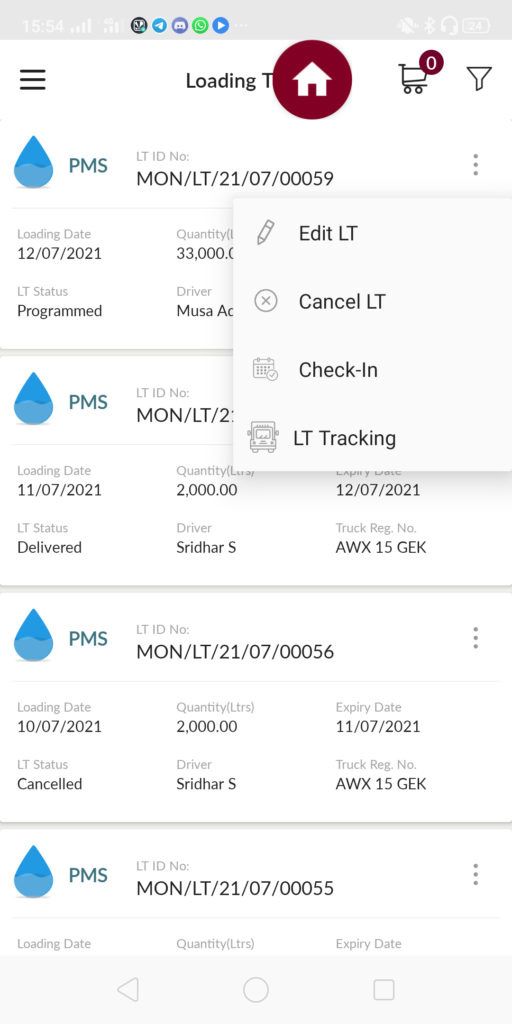
| Page/Screen | Loading Tickets |
| Application | Portal Customer App |
| Role | Dealer, RORO Dealer, CORO Dealer, COCO Dealer, ID |
Once LT is cancelled the stock transactions will be performed as follows
1. LT quantity will be debited from the SSS[Supplier/Company Sold Stock] account.
2. LT quantity will be credited into the SAS[Supplier/Company Available Stock] account.
Example:
LT Programmed Qty – 33,000 Ltrs
| Account Type | Transaction Type | Quantity |
| SSS | Debit | 33,000 |
| SAS | Credit | 33,000 |
2.5 Block Loading Ticket
Loading ticket can be blocked at any time before completing the end batch or waybill. Once the loading ticket is blocked then the status of the LT becomes as Blocked. User can unblock the blocked loading tickets by clicking on the unblock button, once user unblock the LT then the status of the LT becomes Programmed.
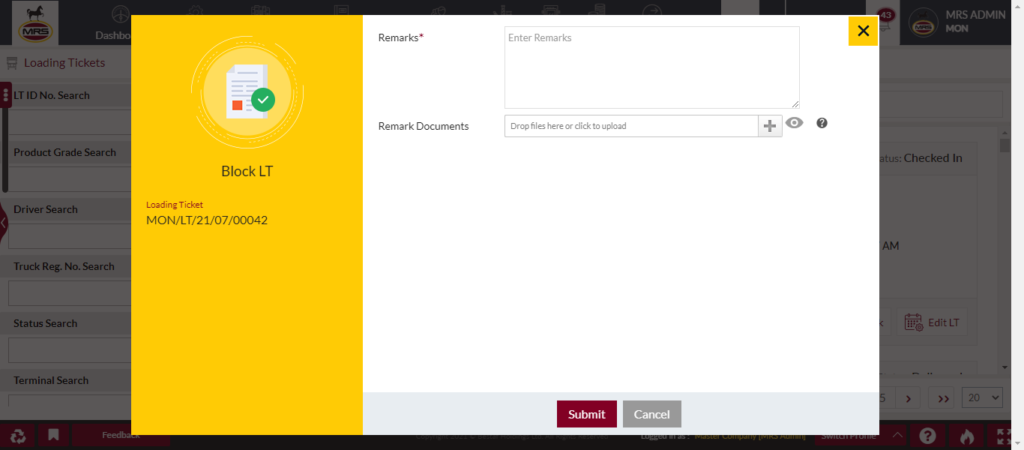
| Page/Screen | Loading Tickets |
| Application | Portal Web |
| Role | CC Team |
2.6 Add to Waiting List Loading Ticket
Loading ticket can be add to waiting list at any time before completing the end batch or waybill. Once the loading ticket is added into waiting list then the status of the LT becomes as Waiting List. User can move the waiting list loading tickets by clicking on the Out of WL button, once user moved the LT from WL then the LT status becomes Programmed.
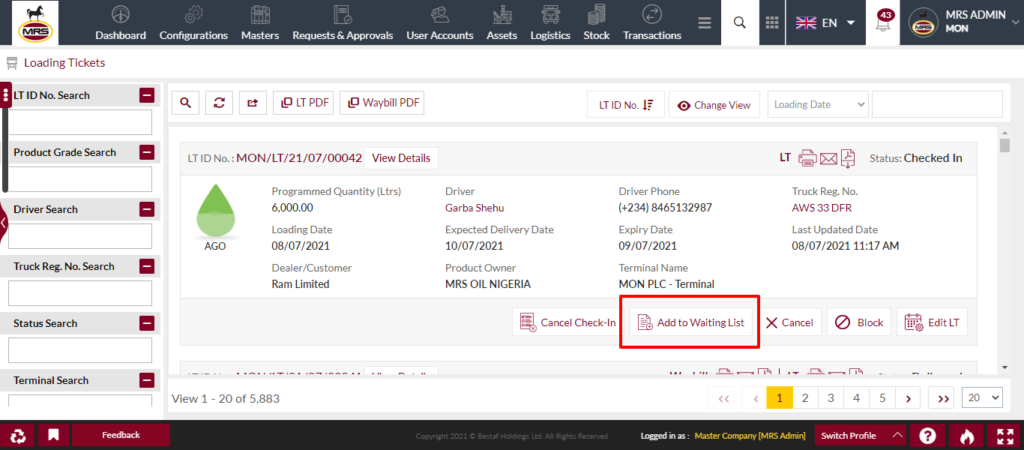
| Page/Screen | Loading Tickets |
| Application | Portal Web |
| Role | CC Team |
2.7 Depot Check In LT
If the loading ticket is waybilled and the destination of the loading ticket is not non-bridging or local delivery then the depot check-in option will be coming to the RORO/CORO/COCO/ID loading tickets. Once truck reaches the destination then the depot superintendent can perform the depot checkin.
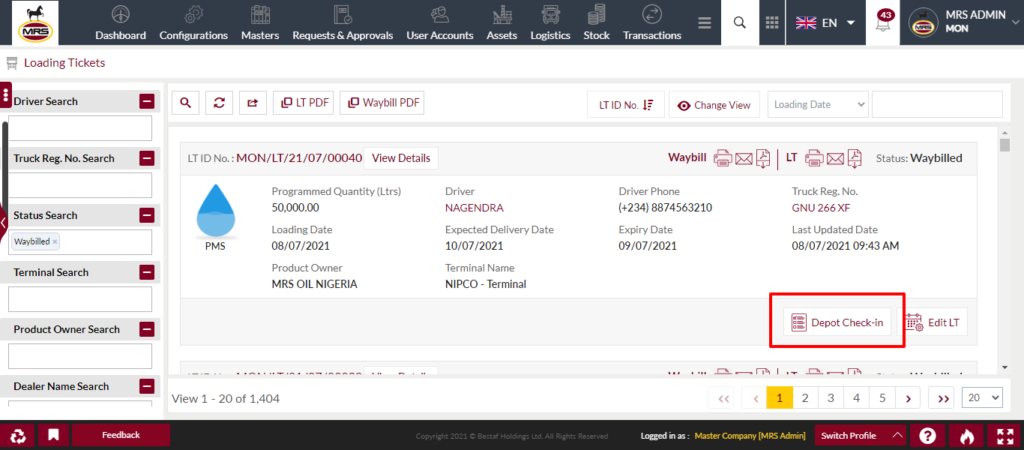
| Page/Screen | Loading Tickets |
| Application | Portal Web |
| Role | Depot Superintendent |
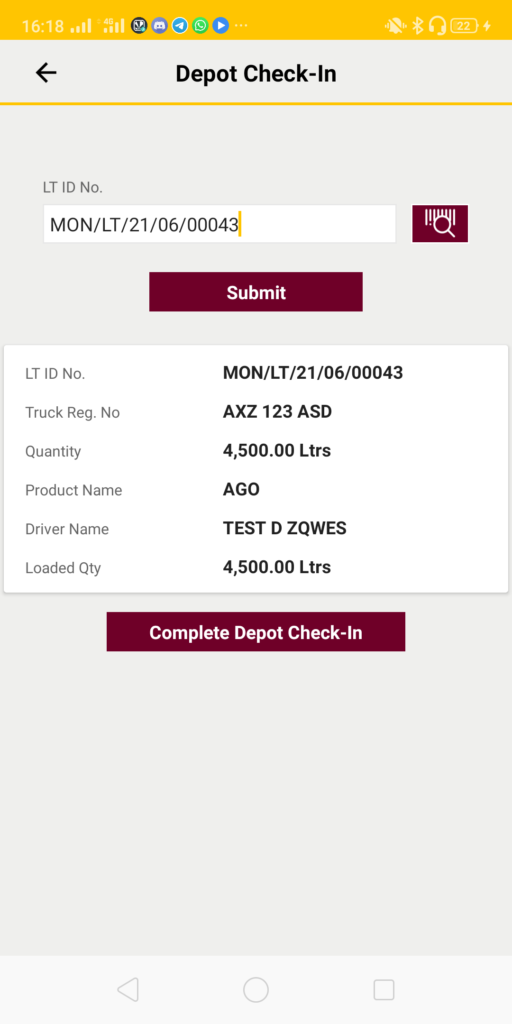
| Page/Screen | LT Depot Checkin |
| Application | MON TAS |
| Role | Depot Superintendent |
2.8 Dispatch Loading Ticket
After completion of the the depot check in and the truck is moving from the destination to final destination then the depot superintendent will perform the dispatch by providing the PPMC check and PEF Check details
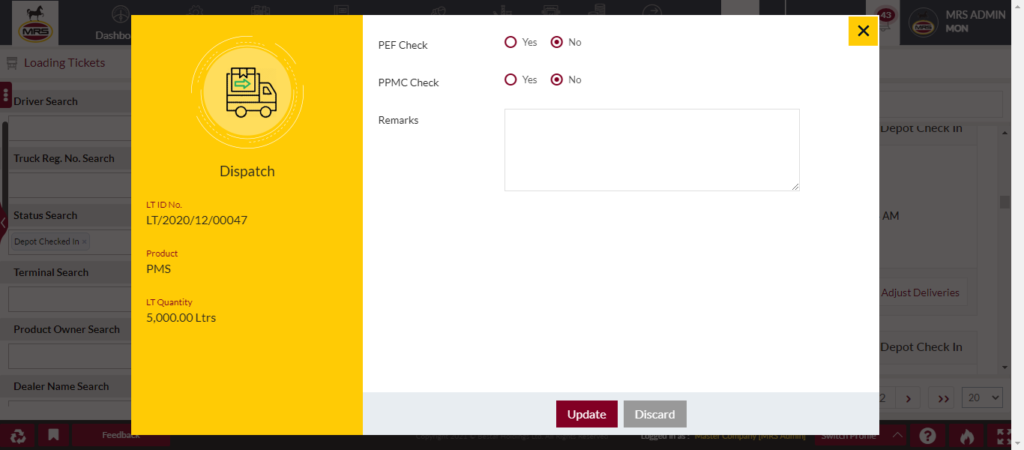
| Page/Screen | Loading Tickets |
| Application | Portal Web |
| Role | Depot Superintendent |
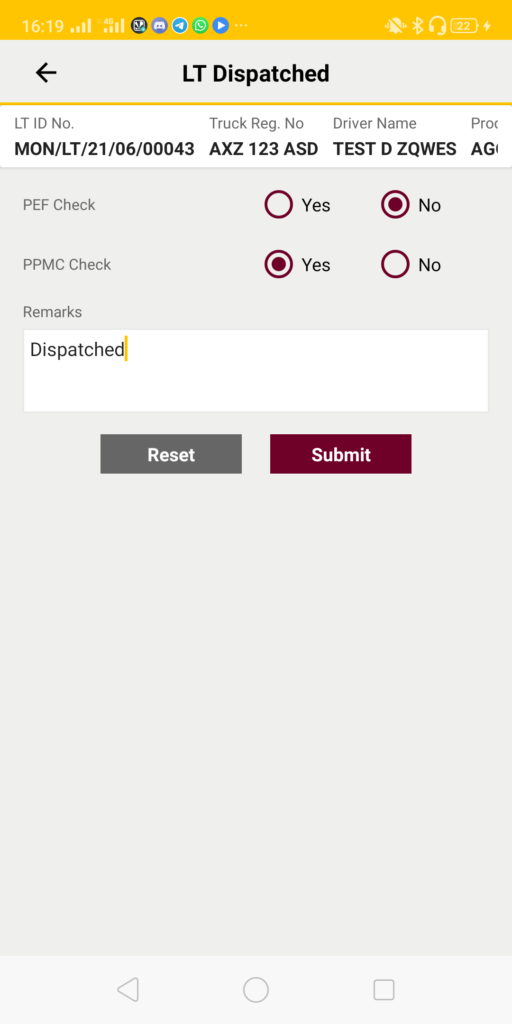
| Page/Screen | LT Dispatch |
| Application | MON TAS |
| Role | Depot Superintendent |
2.9 Delivery Confirmation of LT
Once the loading ticket is waybilled and the destination is non-bridging then the customers/dealers can provide the delivery confirmation to the loading ticket otherwise the loading ticket status is dispatched then the customer/dealer can provide the delivery confirmation of the LT.
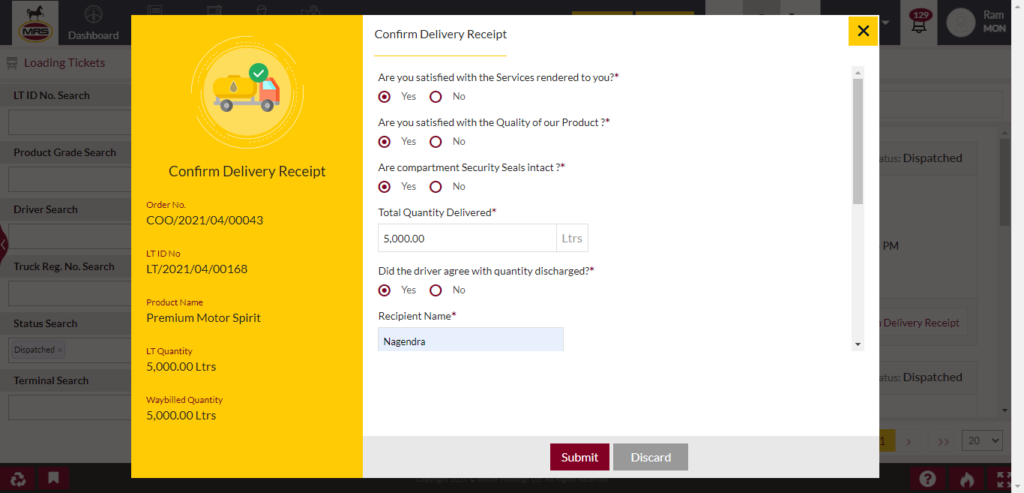
| Page/Screen | Loading Tickets |
| Application | Portal Web |
| Role | Dealer, RORO Dealer, CORO Dealer, COCO Dealer, ID |
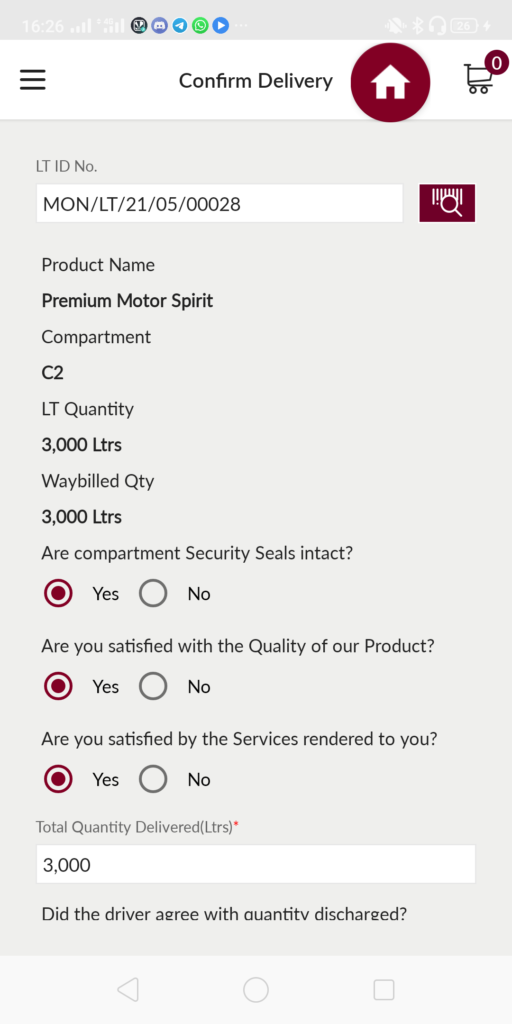
| Page/Screen | Confirm Delivery |
| Application | Portal Customer App |
| Role | Dealer, RORO Dealer, CORO Dealer, COCO Dealer, ID |
3.0 Wallet Deduction against Invoice
Based on the customer’s/dealers billing mode the invoice will be generated either after waybill generation or the LT delivery confirmation. After invoice generation the wallet will be deducted with the invoice amount against the invoice.
3.1 Update of Product Stock and its WAC at Station
After completion of the delivery confirmation then the confirmed quantity will be credited at the stations product stock account and updates the total available quantity at the station. At the same time the weighted average cost of the station product also updates based on the newly credited quantity and the product price.
3.2 Order Cancellation
MRS Admin can cancel the order if there is no pending loading tickets are available for that order. After cancellation of the order the wallet amount will be adjusted accordingly. If the order is pre-paid order then a sales return will be generated and the wallet will be credited with the respective amount. If the order is charge on waybill or charge on delivery then the order amount will be released from the pending orders amount.
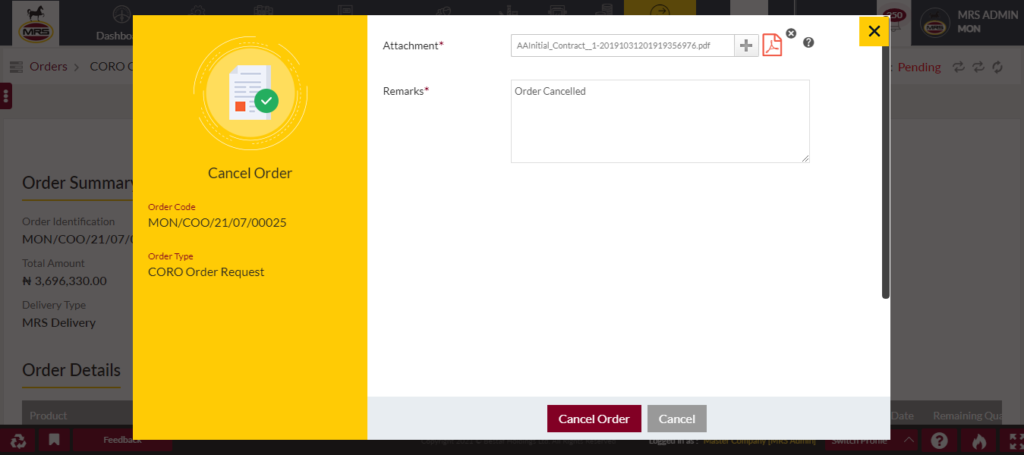
| Page/Screen | Order Detail Page |
| Application | Portal Web |
| Role | MRS Admin |
Example:
Order Qty – 33,000 Ltrs
| Account Type | Transaction Type | Quantity |
| SOSS | Debit | 33,000 |
| SOAS | Credit | 33,000 |